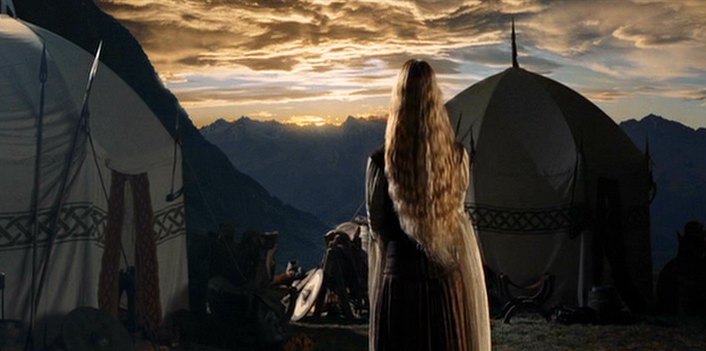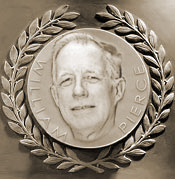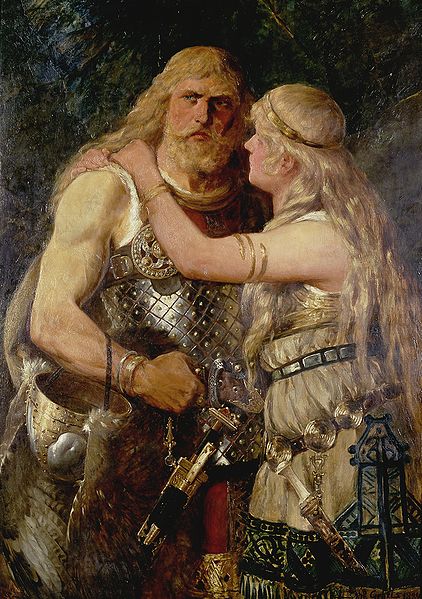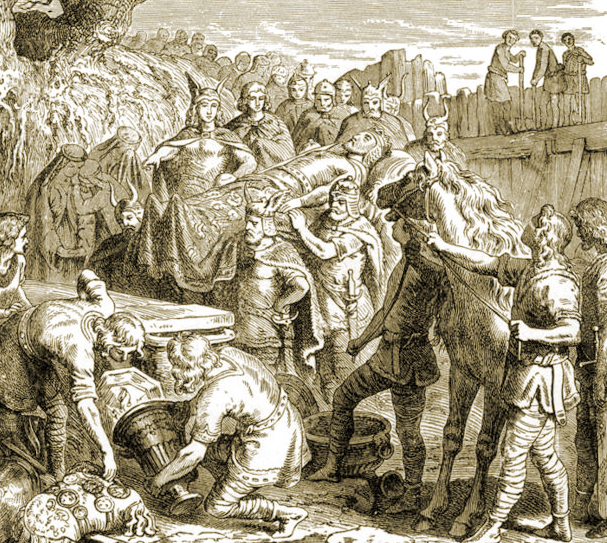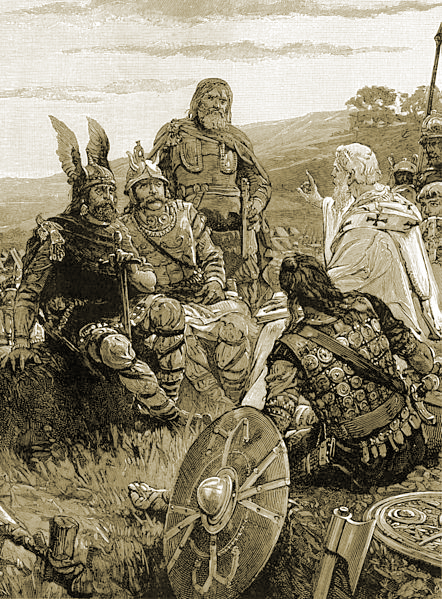Editor’s note: This article by William Pierce
is the best I have read on the Jewish Question:
Every week I receive a number of letters from listeners who believe that I blame the Jews too much for the destruction of our society. I’m not referring now to the letters from crazed Christian fundamentalists who rave at me about the Jews being “God’s chosen people” and therefore entitled to do whatever they want without criticism. These pitiful souls tell me, “God’ll get you if you say anything bad about the Jews. Don’t you know that Jesus was a Jew?”
And I also am not referring to the letters from lemmings, who simply parrot back the Politically Correct party line they’ve learned from watching television, to the effect that Jews are just like everybody else, except better, and that the only reason I speak critically of them in my broadcasts is that I’m jealous of their success. They tell me that I’m an embittered loser who lives in a trailer, has bad teeth, and never got an education, and that I spend most of my time getting drunk and doing intimate things with my female relatives, because the media have taught them that all people who live in West Virginia are like that.
Anyway, I never waste time arguing with people about their religion, whether it is Christian fundamentalism or Political Correctness. Unless people have a reasoned basis for their beliefs, a reasoned argument with them is pointless. The believers I want to argue with today are those who believe that I am incorrect in imputing bad motives to the Jews as a whole. Some of them tell me, it’s not the Jews per se who’re destroying our race and our civilization; it’s the rich people, Jewish and non-Jewish. It’s the greedy billionaires, who keep our borders open to the Third World because they want a steady supply of cheap labor. It’s the crooked lawyers, Jewish and non-Jewish, who run our legislatures and our courts to enrich themselves rather than to give us good laws and justice.
And of course, the people who tell me this are correct—up to a point. It is true that Gentile billionaires do tend to put their further enrichment at the top of their list, and they do tend to go along with the Jewish billionaires in many things. They seldom see any profit to themselves in opposing the Jews, even when they don’t agree ideologically with them. Billionaires are more inclined to go with existing trends and try to profit from them than to buck those trends and risk losing money. It has been truly said that it is easier for a camel to pass through the eye of a needle than for a rich man to… do anything which might diminish his fortune. And it also is true that most lawyers chose their profession not with the aim of serving their people or because they are interested in law, but rather because they see it as a way to personal wealth and power. And it also is true that we have a lawyer-ridden society. We should have people other than lawyers setting policy.
More generally, it is true that if one looks into every destructive institution in our society, if one looks behind every destructive policy, one finds non-Jews as well as Jews. The ruinous immigration policy we have now in the United States is favored by some Gentiles as well as by virtually all Jews. The 1965 immigration law which shifted the flow of immigrants into this country from mostly European to mostly non-European was pushed primarily by Jews, but Senator Ted Kennedy was a co-sponsor of the law. The Jews may be taking over organized crime in America, but there still are some Italians involved in it. The most active legislators in the Congress pushing for the curtailment of our right to keep and bear arms are Jews, but many Gentiles also are involved. If we look into the destructive exploitation of our natural environment, the cutting down of our forests and the strip-mining of our land and the polluting of our rivers, we probably will find greedy and short-sighted Gentile profiteers more often than we will find Jews. And even in the mass media, one can still find some non-Jewish media bosses who promote essentially the same party line as the Jewish media bosses: Rupert Murdoch is an example.
All of that is true. So, then, why don’t I just complain about the plutocrats or the lawyers or the businessmen? Why do I single out the Jews? The answer to that is that if we don’t look at the Jews specifically, if we don’t try to understand them as Jews, then we can never really understand what is happening to our race and our civilization. And if we don’t understand what’s happening, we’re much less likely to be able to change things for the better. We need to understand the process, and in order to understand the process we need to understand the Jewish role in it—because it is the key role.
Let’s back off a bit and just ask ourselves, what is the single most powerful and influential institution in American life today? What institution, more than any other, is promoting the worst and most destructive trends in American life? Is it professional basketball? That’s certainly a noxious influence—but it’s not the most noxious. Is it the Internal Revenue Service? No. It isn’t even the Clinton government of which the Internal Revenue Service is a part, because the Clinton government itself is only a creature of the most powerful institution, and that most powerful institution is made up of the mass media of news and entertainment which together shape public opinion and control public policy. And these media in turn are dominated by Jews.
I won’t go into all of the names and organizational relationships today, because I’ve done that a number of times in past broadcasts, and the details are all in a pamphlet I publish and update regularly, it’s called Who Rules America?, and if you send $2 to the sponsors of this broadcast they’ll send you a copy. But just a quick summary: the three giants in the electronic media are Disney-ABC, headed by Michael Eisner; Time Warner-CNN, headed by Gerald Levin; and the new Viacom-CBS conglomerate, headed by Sumner Redstone. Eisner, Levin, and Redstone are all Jews, but it’s not just the men at the top who’re Jews; these media giants are staffed by Jews from top to bottom.
In the print media the country’s three most influential newspapers are the New York Times, the Wall Street Journal, and the Washington Post. All three of them are owned or controlled by Jews. The only three widely read weekly news magazines in the United States are Time, which is owned by Gerald Levin’s Time Warner-CNN; Newsweek, which is owned by Katharine Meyer Graham’s Washington Post Company; and U.S. News & World Report, which is owned by Jewish real-estate developer Mort Zuckerman. The story is the same in the Hollywood film industry and throughout the rest of the mass media of news and entertainment.
Now, there are people who will tell you with a straight face that this almost total domination of the most powerful institution in our society by the Jewish minority, which makes up only 2.5 per cent of the U.S. population, is just a coincidence, that it has no sinister significance. It just as well could have been Mormons or Jehovah’s Witnesses who happened to rule the media. What difference does it make?
When grown men say something like that, you can safely bet that there’s something other than reason at work. Usually it’s fear: not so much a conscious fear as a conditioned avoidance reflex, the product of a long-term program of media conditioning of the public never to say or even think anything negative about Jews, lest one be labelled an “anti-Semite” or a “Nazi.” Really, the proper name for this sort of conditioning is “brainwashing.”
Think about it for a minute.
Imagine yourself in a group of yuppies, at a restaurant, say, or a cocktail party: a fairly sophisticated and irreverent sort of crowd. You can make a joke about the Pope, and even the Catholics in the crowd will laugh. You can say something smutty about Mother Teresa or Martin Luther King without objection. You can express your dislike for homosexuals or feminists. Some of those present may argue against you, but they are not likely to get uptight about it. But if you want to stop the conversation cold and give everyone present a bad case of heartburn, just say something unfriendly about the Jews: either about a specific Jew or the Jews as a whole. Say, for example, something like, “Well, now that that Jew Sumner Redstone has grabbed CBS, there’s hardly any part of the mass media that the Jews don’t own. I think that’s not good for America.” Say that, and then smell the fear in the air as your friends choke on their martinis.
Perhaps I exaggerate a bit, but not much. The Jews do get special treatment, and that is no more a coincidence than their control of the mass media. It has been planned. It is has been engineered.
Now, I am sure that, having said that, the minds of many of my listeners have just locked gears as the conditioned reflex forbidding them to think any unfriendly thought about Jews kicks in. But you know, it is possible to overcome this conditioning, this brainwashing—unless you’re a lemming, that is. Lemmings can’t overcome it because they don’t want to overcome it. They don’t want to think any disapproved thought, any thought that everyone else isn’t thinking. But if you’re a person who wants to think clearly about this matter, all you have to do is begin looking at the facts. Take your time. Study the facts carefully: not just the facts I offer to you, but also everything else you can dig up on the subject. Think about the implications. Reach your own conclusions. You can overcome the conditioned fear—and as a responsible adult, as a responsible American, as a responsible member of your race, you should.
And when you no longer are afraid and you finally are able to look the truth squarely in the face, you no longer will believe that it is a coincidence that the Jews have elbowed their way into virtually every position of control in the mass media. You no longer will believe that the Jews do not use the power consciously and collectively that this media control gives them. I’ll say that again: the Jews use their control over the mass media, not as individual capitalists, the way the few non-Jews in the media do, but they use it collectively and cooperatively to advance Jewish interests. That is why you can see a common propaganda agenda throughout all of the controlled media. They all promote the image of the Jew as a victim, never as a predator or aggressor; they all promote the image of the Jews as sensitive and creative and sympathetic, not as the sort to plan and organize a bloody Bolshevik revolution and butcher tens of millions of innocent Russians and Ukrainians or to run the White-slave business and force thousands of young European girls into a life of prostitution every year—or as the sort to elbow their way into the key positions of media control and then to help their fellow Jews do the same thing.
And they also all push interracial sex. They all push the lie that most interracial crime is White on Black. They all suppress any news which contradicts that lie. They all try to persuade us that homosexuality is normal and acceptable, just an alternative life-style. They all propagandize for multiculturalism and for more diversity and for keeping our borders open to the Third World and for scrapping the Second Amendment—all of them.
Now, let’s back up for a moment, because I’ve just said something extremely important, and I want to be sure that it sinks in: that I have convinced you. I think that most perceptive and responsible people, once they have made up their minds that they want to know the truth, can accept the fact of Jewish media control; that fact is really undeniable. I think that most of them can then take the next step and conclude that this Jewish media control is not just a coincidence: they can conclude that the Jews deliberately and cooperatively set out to achieve this control and then to use it to advance their collective interests.
People can understand that in terms of the sort of group behavior with which they already are familiar. The members of other groups also cooperate in order to achieve group power and then use this power to advance their group interests. And so it should not be surprising that the Jews in the media collaborate to create a favorable image of themselves in the public mind. Most people can persuade themselves that it’s not “anti-Semitic” to believe that Jews behave like many other groups do in order to advance their group interests.
It’s the next step that is difficult for many people: it is recognizing that the propaganda agenda of the Jewish media bosses goes far beyond promoting a favorable image of themselves; it also promotes everything which is unfavorable to the non-Jewish majority. And this destructive propaganda is not a coincidence either; it is the product of a planned, deliberate, collaborative effort.
Reaching this conclusion is a big step, a difficult step, for many people—even for people who want to understand, who want to know the truth. It’s a big step because it separates the Jews from every other special-interest group. It sets the Jews aside from the rest of humanity and identifies them as a uniquely hostile, destructive, and deceptive group. It identifies them as a group which is uniquely dangerous to our people. And it leaves anyone who takes this step open to the charge of “anti-Semitism.” Certainly, if you take this step—if you reach this conclusion—and you announce your conclusion publicly, you will be denounced as an “anti-Semite” by the media bosses—and probably by the lemmings too.
And so I don’t want you just to take my word for this very important conclusion about the nature of the Jews as a uniquely hostile and dangerous group. I want you to study the facts. I want you to think about the evidence and reach your own conclusion. But I don’t want you to stop short of a conclusion because of fear, because of brainwashing. I want you to overcome your fear and examine the evidence objectively.
I will make a few more observations about this conclusion and its implications now, however. Let me tell you, it really is the key to understanding many other things: the history of the Jews in Europe—and elsewhere—for example. Why were the Jews always picked on and persecuted far more than any other group? Why did everyone else always hate them? Why have they been kicked out of virtually every country in Europe during the past thousand years: out of England and Spain and Portugal and France and Sweden and Germany and a dozen other countries and told never to come back, only to sneak back in and then be kicked out again? The Jews will tell you that it was Christian bigotry. But Christian bigotry cannot explain why the Egyptians threw them out of Egypt more than a thousand years before Christ, and it cannot explain why the pagan Greeks and Romans hated them. I used to wonder about these things. And even after I began to suspect that the socially and racially destructive activities of the Jews were planned and deliberate, I didn’t know why. It didn’t make sense to me that the Jews would deliberately seek to destroy a society in which they were riding high—that they would deliberately drill holes in the bottom of a boat in which they were passengers. I couldn’t figure it out—until I understood the nature of the Jews.
And that nature really is unique. At some time far back in the prehistoric period, certainly more than 3,000 years ago, the Jews developed a unique mode of survival as predators and parasites. Whereas other races, other tribes, sought either to live alone among their own kind—or to conquer other tribes militarily and take their land or require them to pay tribute—the Jews sought to invade the territory of other races by stealth and then to subvert them, to undermine their morale, to break down the order and structure in their societies as a concomitant to controlling them and exploiting them.
In the beginning, thousands of years ago, this may have been only a novel plan for gaining control of a particular neighbor, but eventually it developed into a way of life. It became part of their religion, and eventually it got into their genes. I believe that today they really can’t help themselves. And as I said before, you do need to think carefully about this. You need to study the facts. It’s difficult for many people to understand the Jews because they really are different from every other ethnic group.
One aspect of the Jewish problem which adds to the difficulty many people have in coming to grips with it is that the Jews are not just a scheming and sinister kehillah of adult male media bosses. They are a complete community, with women and children and many members on the fringes: part-Jews, dissidents, and so on—even a few anti-Jewish Jews. There are approximately six million Jews in the United States, by their own count, and they can’t all be film studio owners or newspaper publishers or promoters of “rap” music or Hollywood scriptwriters. Most of them live and work in a way which gives them relatively little personal opportunity for damaging our society. They are simply teachers and businessmen and merchants and lawyers and doctors, earning a living more or less like everyone else—but not quite.
You must back off a bit in order to see the forest rather than just the trees. The essential thing about the forest is that it is destroying our world. It is a parasitic forest. It is injecting spiritual and cultural poison into our civilization and into the life of our people and sucking up nutrients to enrich itself and grow even more destructive. Perhaps only 10 per cent of the trees in this Jewish forest have roots deep enough to inject their poison into us, and the other 90 per cent play only supporting roles of one sort or another. It is still the whole forest which is our problem. If the forest were not here we would not have had to endure the curse of Bolshevism. If the forest were not here America would not be growing darker and more degenerate by the year. It is the whole forest, not just a few of the most poisonous trees in it, which must be uprooted and removed from our soil if we are to become healthy again.
The essential point again is this: not every Jew has a leading role in promoting the evils which are destroying us, and not every person is a Jew who is collaborating with the leading Jews who are promoting evil, but it is only because the Jews as a whole are among us that the evils they always promote are overwhelming us. If the Jews were not present we could overcome the evil men of our own race. The evil men of our own race may seek their own profit at the expense of the rest of us, but they do not seek to destroy our race. Only the Jews seek that.
_____________________________
Free Speech
October 1999
Volume V, Number 10

